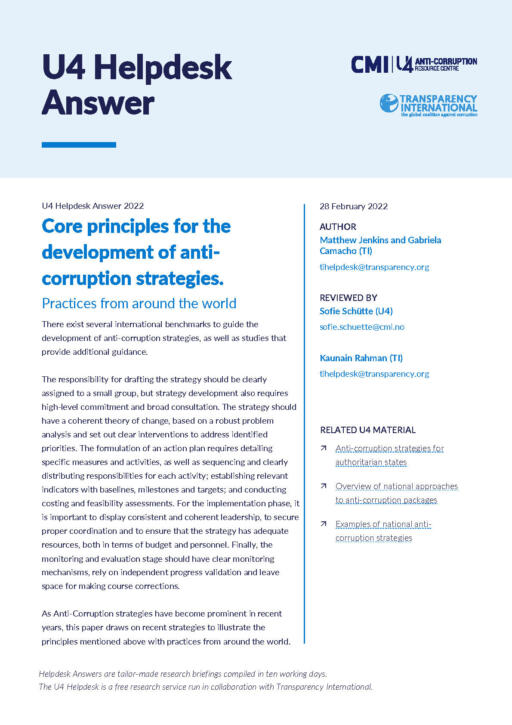
This Anti-Corruption Helpdesk brief was produced in response to a query from a U4 Partner Agency. The U4 Helpdesk is operated by Transparency International in collaboration with the U4 Anti-Corruption Resource Centre based at the Chr. Michelsen Institute.
Query
Please provide an overview of the core principles for developing, implementing and monitoring anti-corruption strategies. Please also provide real-world examples of good practice in regard to these principles.
Summary
There exist several international benchmarks to guide the development of anti-corruption strategies, as well as studies that provide additional guidance.
The responsibility for drafting the strategy should be clearly assigned to a small group, but strategy development also requires high-level commitment and broad consultation. The strategy should have a coherent theory of change, based on a robust problem analysis and set out clear interventions to address identified priorities. The formulation of an action plan requires detailing specific measures and activities, as well as sequencing and clearly distributing responsibilities for each activity; establishing relevant indicators with baselines, milestones and targets; and conducting costing and feasibility assessments. For the implementation phase, it is important to display consistent and coherent leadership, to secure proper coordination and to ensure that the strategy has adequate resources, both in terms of budget and personnel. Finally, the monitoring and evaluation stage should have clear monitoring mechanisms, rely on independent progress validation and leave space for making course corrections.
As Anti-Corruption strategies have become prominent in recent years, this paper draws on recent strategies to illustrate the principles mentioned above with practices from around the world.
Contents
- Introduction
- Inclusive drafting process
- Coherent theory of change
- Formulation of an action plan
- Robust implementation phase
- Monitoring mechanisms for adaptive management
- References
Main points
- The main principles for the development of anti-corruption strategies can be divided into five core phases of elaborating a strategy.
- Drafting process: overall responsibility for the strategy should be clearly assigned, political support of the highest level secured, and broad consultations led to collect inputs for the strategy.
- Theory of change: a robust problem analysis and a logical framework that clearly link the problem to the prioritised objectives.
- Formulation of an action plan: it should clearly outline the activities and measures, as well as how they will be prioritised and sequenced and who will be in charge of each one. Indicators with baselines, milestones and targets should identified and costs and budgeting taken into consideration.
- Implementation phase: good implementation comes with assigning the leadership of the strategy to one executive body and outlining the coordination mechanisms between all the relevant actors, including international networks.
- Monitoring for adaptive management and iterative programming.
Caveats
This paper attempts to distil good practices from a range of national anti-corruption strategies. This task would be easier for researchers if national authorities made more information from monitoring and evaluation publicly available. The cases included in this paper should be considered illustrative, as they have not necessarily been definitively proven to have yielded particularly impressive results. Finally, while the focus of this Helpdesk answer is on national strategies, much of the substance would also apply to sector-specific strategies.
Authors
Matthew Jenkins and Gabriela Camacho (TI), [email protected]
Reviewers
Sofie Schütte (U4), [email protected]
Kaunain Rahman (TI), [email protected]
Date
28/03/2022

